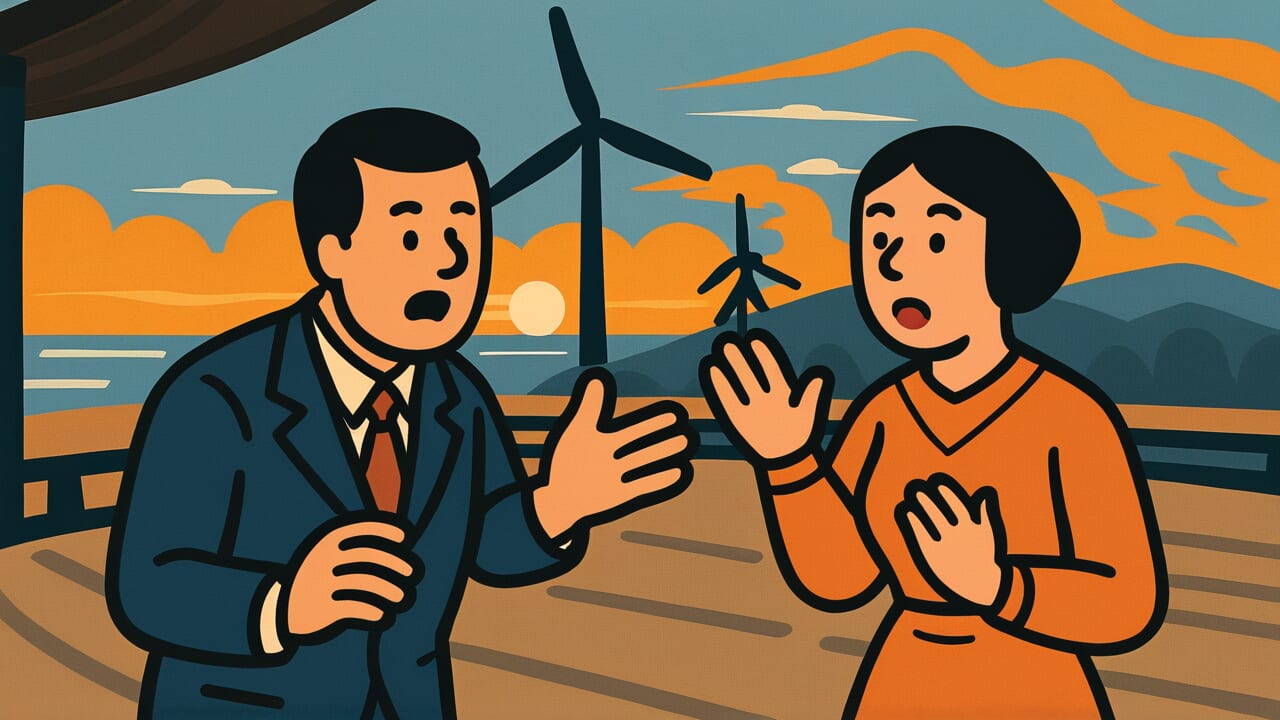How to Read “West winds and marital quarrels last only until evening”
にしかぜとふうふげんかはゆうかぎり
Meaning of “West winds and marital quarrels last only until evening”
This proverb means that even intense things are temporary and will eventually calm down. Just as west winds blow strongly during the day but quiet down by evening, married couples’ arguments naturally settle by the end of the day, no matter how heated they become.
You use this saying when facing intense conflict or angry emotions. It conveys hope that what seems like a storm now will surely calm down with time.
It’s especially effective when calming someone who’s emotional or encouraging yourself during difficult moments.
This expression works because it uses a natural phenomenon everyone can understand. This makes it easier to grasp that human emotions change in the same way.
Even today, you can apply it to various relationship troubles like workplace conflicts or arguments with friends. It expresses a universal truth: time heals even the most intense anger.
Origin and Etymology
No clear written records exist about this proverb’s origin. However, we can make interesting observations from the words themselves.
“West wind” holds special meaning in Japan’s climate. From spring through summer, low-pressure systems move from west to east across the Japanese archipelago, bringing west winds.
These west winds tend to blow strongly during the day but naturally die down by evening. This happens due to temperature changes and daily shifts in atmospheric pressure.
“Marital quarrels” were likely chosen as the most familiar example of everyday conflict. Couples see each other daily, so they sometimes argue over small things.
But people living under the same roof can’t hold onto anger forever. By the time they prepare dinner and share the same bed, their feelings naturally calm down.
This proverb probably came from observing that natural phenomena and human relationships share the same rhythm. Things that blow fiercely always settle with time.
Our ancestors’ wisdom applied this natural principle to human emotions. That wisdom lives in this proverb.
Usage Examples
- They’re arguing intensely now, but west winds and marital quarrels last only until evening, so they’ll surely make up tomorrow
- My conflict with the boss is like west winds and marital quarrels last only until evening—once I calm down, I’ll see a solution
Universal Wisdom
This proverb teaches a universal truth: human emotions always have waves, and those waves never last forever. Anger and hatred feel like they cover the entire world in that moment.
But they always fade with time.
Why has this proverb been passed down for so long? Because humans have a weakness—we can’t think clearly when caught in emotional turmoil.
When anger controls us, we mistakenly believe “this feeling will last forever.” We risk saying words we can’t take back or destroying relationships.
Our ancestors deeply understood this human nature. That’s why they referenced an objective natural fact to show hope: “if you wait, it will surely calm down.”
No one can deny that west winds settle by evening. By overlapping this certainty with human relationships, they created words that reach people’s hearts even when they’re emotional.
This proverb contains trust in time’s healing power. Humans aren’t perfect and easily get swept up in emotions.
But we also have the resilience to regain composure once time passes.
When AI Hears This
West winds and marital quarrels both follow the same law governing the universe. According to the second law of thermodynamics, energy always flows from high states to low states, eventually moving toward a uniform, settled condition.
This is called the law of entropy increase.
Consider west winds. During the day, the sun warms the ground, creating temperature differences between locations. This temperature difference is a “high-energy state.”
Air moves to equalize the temperature, creating wind. By evening, the sun sets and temperature differences shrink, naturally weakening the wind. The energy imbalance has been resolved.
Marital quarrels have the same structure. Anger is a high-energy state where neurotransmitters rapidly release in the brain.
Stress hormones like adrenaline and cortisol increase in blood concentration. But the human body can’t maintain this state for long.
Physiologically speaking, these hormones metabolize within hours, and their concentration drops. In other words, emotional intensity is designed to cool down according to physical laws.
It’s fascinating that this proverb specifies time with “until evening.” The timeframe of several hours matches exactly the time the human body needs to process stress hormones.
Emotions are also the movement of substances and the flow of energy.
Lessons for Today
This proverb teaches modern people the importance of not acting immediately in emotional moments. Before posting on social media in anger or sending harsh words in an email, take a breath.
That alone can often prevent regrettable outcomes.
Modern society demands instant reactions to everything. Reply to messages immediately, deal with problems right away.
But decisions made when emotions run high are often not the best ones. As “until evening” suggests, taking a little time reveals completely different perspectives.
Specifically, develop the habit of making important decisions or having difficult conversations after your emotions settle. When you feel angry, don’t try to reach conclusions that day—sleep on it.
When you reread what you wrote last night in the morning, you might feel embarrassed.
When intense emotions strike in your life, remember this proverb. The current storm isn’t eternal.
By evening, the wind will surely calm, and a new morning will come. Trust time as your ally and have the courage to wait without rushing.



Comments